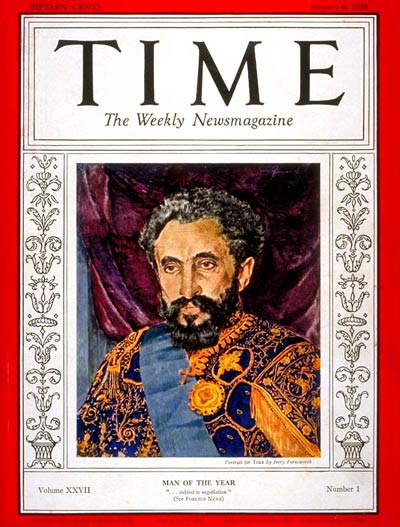Emperor Haile Selassie I (also known as Ras Tafari Makonnen) was the Emperor of Ethiopia from 1930 to 1974. He was born in 1892 in Ejersa Goro, Ethiopia, and became the Emperor following the death of his predecessor, Emperor Menelik II.
.jpg) |
| King of kings Emperor Haile Selassie |
Emperor Haile Selassie I was an important figure in African and world history for a number of reasons. During his reign as the Emperor of Ethiopia from 1930 to 1974, he implemented a number of economic, social, and political reforms in the country and worked to modernize and industrialize the nation. He also played a key role in the formation of the Organization of African Unity (OAU), which was established in 1963 to promote cooperation and unity among African nations.
Haile Selassie was also known for his strong commitment to international peace and cooperation. He made several important speeches at the League of Nations and the United Nations, and he was a vocal advocate for the rights and interests of developing countries.
 |
| Emperor Hailesilasie League of Nations speech |
Haile Selassie is also remembered for his role in the history of Ethiopia. He helped to restore the Ethiopian Empire following the Italian invasion and occupation of the country during the Second Italo-Ethiopian War, and he played a key role in the liberation of Ethiopia in 1941.
Overall, Emperor Haile Selassie is remembered as a visionary leader and a champion of social and political progress. He remains an important figure in the history of Ethiopia and Africa, and his legacy continues to be celebrated and remembered today.
Haile Selassie was also known for his strong commitment to international peace and cooperation. He made several important speeches at the League of Nations and the United Nations, and he was a vocal advocate for the rights and interests of developing countries.
Emperor Haile Selassie I was known for his strong commitment to social and political progress, and he had a number of key philosophical beliefs that shaped his approach to governance and his vision for the development of Ethiopia.
One of the key philosophical foundations of Haile Selassie's rule was his belief in the importance of education and the role it played in the modernization and development of Ethiopia. He believed that education was the key to unlocking the potential of the Ethiopian people and enabling the country to become a modern, industrialized nation. He implemented a number of educational reforms and established a number of schools and universities in Ethiopia, and he encouraged the study of science, technology, and other subjects that he saw as essential for the country's development.
Haile Selassie was also a strong advocate for social justice and equality, and he believed in the importance of providing equal opportunities and support for all members of society. He implemented a number of social reforms aimed at improving the lives of ordinary Ethiopians, including the expansion of healthcare and the establishment of a system of social welfare.
Overall, Haile Selassie's philosophy was focused on the modernization and development of Ethiopia, and he believed in the importance of education, social justice, and equality in achieving this goal.
 |
| Haile Selassie, Man of the Year | Jan. 6, 1936 |
Haile Selassie remained the Emperor of Ethiopia until his death in 1974, at which point he was succeeded by his son, Emperor Amha Selassie.



0 Comments:
Post a Comment